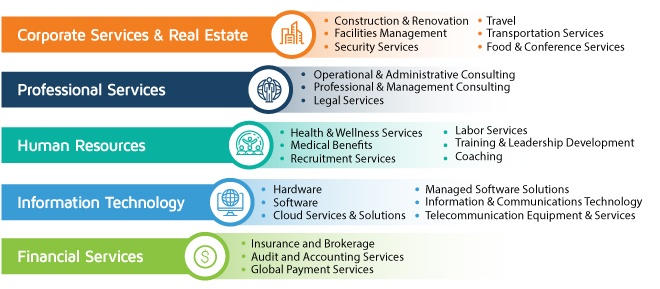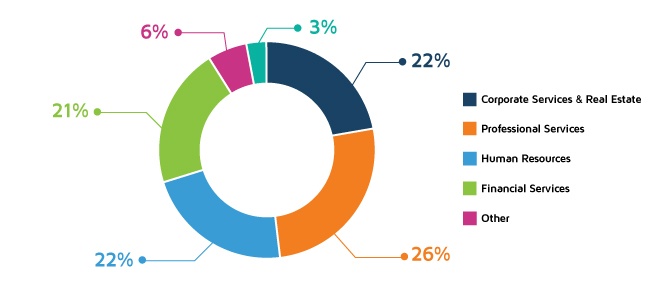The World Bank Group (WBG/WB), one of the world’s largest financial institutions that seeks to end extreme poverty, annually (co)manages or supervises a myriad of development contracts, both through its operational and corporate procurement systems. While operational procurement concerns projects financed by the World Bank but which are managed by local contracting authorities, corporate procurement covers the procurement of goods, works, and (consulting) services necessary for the normal activities of the WB headquarters and its other 130 office locations around the globe.
In view of the strong interest from the development community towards WB’s corporate procurement, DevelopmentAid invited Faith Graham, Category Lead for Professional Services at WBG, to introduce the Corporate Procurement Unit and share some tips on how to target business opportunities, submit solicitations and prepare winning proposals.
Corporate Procurement at WB
The World Bank’s Corporate Procurement Unit is responsible for coordinating and managing the sourcing, selection, and contract execution for goods, works, and (consulting) services for more than 130 offices globally. On an annual basis, the unit oversees over 700 procurement operations, processes about 35,000 purchase requisitions, and approves more than 17,000 contracts and purchase orders with an aggregated value that ranges between US$1.5 and US$2 billion. Each operation is grounded in the presumption that ‘every purchase made is a vehicle for change that supports WBG’s priorities’.
It is worth noting that WB follows a set of strict principles and considerations that are applied to all types of procurement operations. The Bank aims to always obtain the best overall value for all purchases organized through fair, open, and transparent selection processes on a competitive basis (when possible) where all eligible (qualified) bidders have the opportunity to compete. Corporate procurement as a whole is performed along five major categories that include multiple sub-categories for the types of goods, works, and services purchased.
Fig.1. The types of goods, works, and services purchased by the World Bank

The data on corporate procurement for 2021 shows that the Bank allocated about 26% of its budget to contracting Professional Services (26%) followed by Corporate Services & Real Estate and Human Resources services with 22% each, and 21% was directed towards purchasing IT technology. The remaining 9% of the funds were used for Financial Services and other needs.
Fig.2. The World Bank’s corporate procurement spending by category (%, 2021)

Best practices for preparing a proposal
Faith encouraged all parties interested in participating in bidding opportunities for corporate procurement at WB to consider the following aspects:
- Make sure you assess the competition first: aim to participate in bidding opportunities where you are competitive.
- Address the requirements mentioned in the Terms of Reference (TOR)/Statement of Work (SOW) clearly and comprehensively: your methodology needs to be well-articulated and include the details on the relevant qualifications of your team.
- Make sure that your proposal is carefully prepared and easy to evaluate: use charts, diagrams, and other useful tools to make evaluation easier.
- Propose strong project managers and qualified experts: the DevelopmentAid database is a great way to identify and connect with the leading key and non-key professionals in the development sector.
- Emphasize innovative technical solutions: feel free to include novel solutions that are relevant to the proposal at hand.
How do you become a registered vendor with WB?
While there is no need to be a registered vendor to participate in WB’s solicitation process, parties are required to complete a Vendor Registration form, provide the necessary documentation, and have their application approved before they can receive a contract award. Moreover, there are some important eligibility aspects to consider before submitting a solicitation:
- Parties should have a minimum of 1 year of experience in doing business
- They should have no more than 20% of their revenue coming from WBG
- Parties should have the appropriate business licenses and valid certifications
- Vendors with multiple clients/customers have priority
- Parties should accept World Bank Group’s Terms & Conditions before any business is undertaken
Here are some useful links:
- More information on Vendor Eligibility Criteria
- Corporate Procurement Contract Awards
- Terms and Conditions for providing Goods and Services
- Terms and Conditions for engaging in Consulting Services
- Corporate Procurement Vendor guide
Contacts: corporateprocurement@worldbank.org
For those who did not have the opportunity to join us for this online event, a link to the recorded version can be found here. The presentation materials used during this webinar can be requested at e.rata@developmentaid.org.
We invite you to our next webinar on “Global food security. How is the war zone affecting this?” which will take place on 9 June 2022 at 4 PM (Brussels) or 10 AM (Washington DC). Our guest speakers, Kerstin Marit Uhl and Ranja Chrys Rakotomahanina bring extensive expertise in leading development projects in the area of global food security. They will analyze the consequences of the Russian-Ukrainian war on international food security and will discuss some response measures at the project and program levels.
You can register here.
DevelopmentAid is the leading provider of business intelligence and recruitment tools designed to assist all those active in the development sector. Join today and gain access to exclusive information on the full array of upcoming funding opportunities from over 200 international donors.

